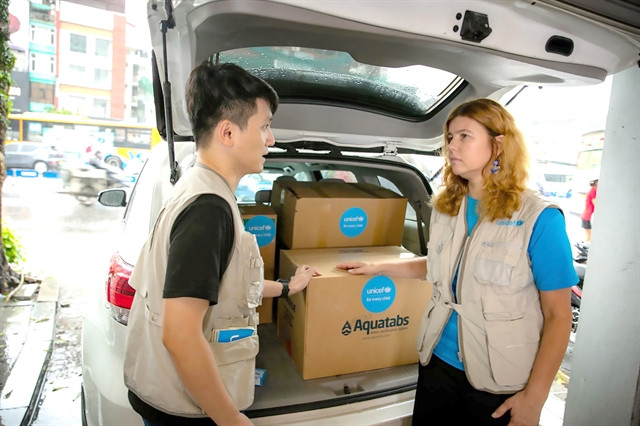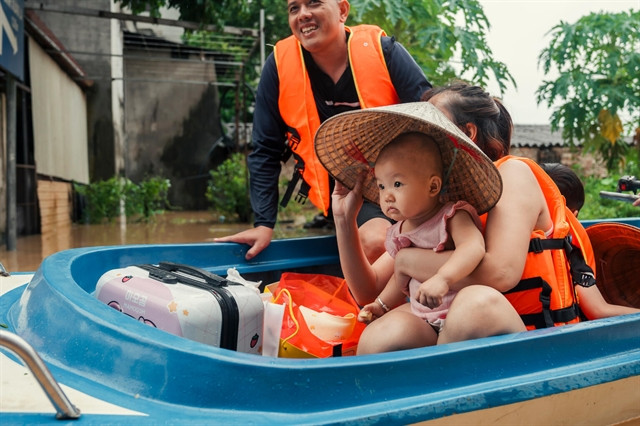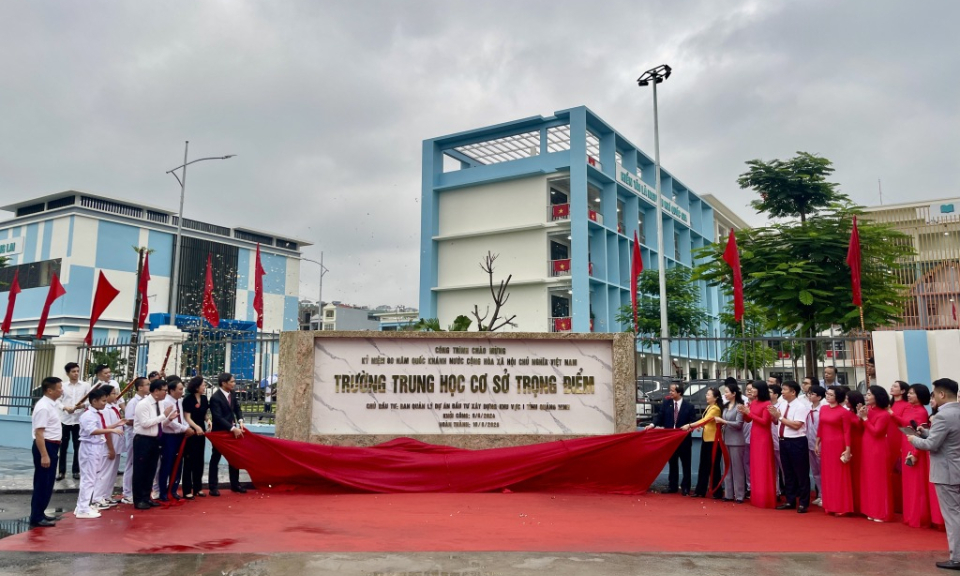UNICEF 'fully committed' to supporting Government's efforts to mitigate typhoon's aftermath
Through government partners, UNICEF is already providing humanitarian supplies to affected people.
The United Nations Children's Fund (UNICEF), a key provider of emergency disaster relief, is committed to assisting the Government of Việt Nam in addressing the devastation of Typhoon Yagi, the organisation's Representative to Việt Nam Silvia Danailov told Việt Nam News in an interview.
Northern Việt Nam has been significantly impacted by Typhoon Yagi, leading to extensive damage and losses. Could you provide an assessment of Việt Nam’s efforts in natural disaster prevention and forecasting, as well as the strategies implemented to mitigate the recent damage?
Firstly, I want to express my deepest sympathies and condolences, on behalf of UNICEF, to the people of Việt Nam who have suffered loss of countless lives, injuries, major damage to livelihoods and disruptions to their daily lives due to this devastating storm. Unfortunately, the situation continues to worsen in the aftermath of the storm.
Before the storm hit, the Government of Việt Nam took remarkable, proactive and well-coordinated steps to secure the safety of its people and vital infrastructure. Their preventive actions ranged from timely evacuation procedures to the mobilisation of response teams and the safeguarding of critical areas like sea dikes. These actions highlight the government's commitment to disaster prevention and forecasting and to protecting lives and livelihoods, which is commendable. UNICEF has supported these efforts by assisting the authorities in circulating crucial prevention and preparedness messages among the population, with a focus on children and women.
In the wake of the storm, the government has been swiftly carrying out initial damage assessments and launched response efforts on the ground, including with the support of international and local humanitarian actors. The swift activation of the Disaster Risk and Response Partnership, a coalition consisting of government bodies, UN agencies including UNICEF, International NGOs and humanitarian partners, is a testament to the spirit of solidarity, cooperation and resilience in the face of adversity. This collective, strategic response is not just commendable, it's inspirational.
Could you share more about UNICEF’s support plan for Việt Nam? What will be the focus?
UNICEF’s response is focused on supporting the government’s efforts. We work closely with government partners and UN sister agencies and other partners to address immediate humanitarian needs and long-term recovery and resilience building efforts.
Through government partners, UNICEF is already providing humanitarian supplies to affected people. For example, this week we provided water supplies to the general hospital in Lào Cai and the Centre for Disease Control in Thái Nguyên. In the days to come, we’ll deliver more water purification tablets, water tanks, ceramic filters and hand sanitisers for distribution to households, schools and healthcare facilities in Yên Bái and Lào Cai provinces. We have also participated in government-led needs assessments and our emergency support prioritises helping save lives and restoring basic services for the most vulnerable populations, especially children.
UNICEF emergency interventions are focused on ensuring access to safe water, sanitation, hygiene, health services, nutrition, education and child protection, as well as providing humanitarian cash assistance to vulnerable families. We are fully committed to supporting the Vietnamese government's strong efforts to mitigate the disaster's impact.
Our primary actions include:
- Distributing water treatment, hygiene and sanitation supplies to households, health centres and schools.
- Supplying emergency medical and nutritional aids to severely affected areas.
- Assisting in school reopening and providing psychosocial support to affected children.
- Delivering emergency kits to the most affected children and families.
- Disbursing humanitarian cash assistance to the most vulnerable households, to allow them to meet immediate needs.
With our extensive experience in emergency response, we are fully prepared to reinforce the national response alongside other UN agencies.

What immediate actions should Việt Nam prioritise to mitigate the aftermath of Typhoon Yagi and what long-term strategies should be considered to recover from this crisis?
In support of government efforts, our priority at this moment is saving lives and completing a comprehensive assessment of the situation. This involves a good understanding of the conditions of the most vulnerable populations, including children, identifying immediate life-saving interventions and supporting the resumption of essential social services.
For example, as of today, we know per government reports that more than 20 children have tragically lost their lives, and we fear this number may rise. An estimated 5.5 million children, including 1.2 million under five, live in the most affected provinces, and millions more are affected by serious floods and landslides, which could lead to waterborne diseases. To secure access to water, hygiene and sanitation, UNICEF is prepared to provide water treatment and safe storage supplies for at least 400,000 households.
With an estimated two million children experiencing disrupted learning due to school closures, the reopening of schools is also a priority that UNICEF stands ready to support. We also work to ensure continued access to primary health care, nutrition and immunisation for children. We all know that ensuring vaccinations for children is critical to avoid significant health issues in the future – so this is a key point if we think about the long term.
Can you share any international strategies or lessons that might enhance Việt Nam’s capabilities in natural disaster prevention and forecasting, as well as support in the recovery and preparedness for future disasters?
I applaud the government's immediate measures to save lives and ensure safety, especially for children. Việt Nam’s forecasting abilities are commendable, as is its participation in global and regional initiatives for disaster prevention and response.
The fact that the government has mobilised responses at the highest level, including calling on support from UN agencies like UNICEF, is a commendable example of effective disaster management. Việt Nam has learnt from international experiences and its own efforts also offer valuable experiences for the international community. The recognition for Việt Nam’s comprehensive and proactive disaster response approach is indeed well deserved.
International experience in climate-related emergencies highlights the importance of investing in child-centred prevention and response plans and strengthening the capacities of all relevant stakeholders. Approaches that focus on community empowerment, gender-responsive initiatives and inclusive, affordable and sustainable services are crucial. As a UN agency, UNICEF can offer its expertise in disaster risk reduction and climate change adaptation and mitigation in various sectors to the Vietnamese Government, as we are doing already. — VNS
UNICEF is mobilising resources to ensure emergency aid is urgently provided. An initial US$11 million is urgently required to be able to deliver on its mandate to assist the most vulnerable children. As the full impact of the typhoon unfolds, additional resources will be critical to meeting the urgent needs of children and families in the affected regions.






